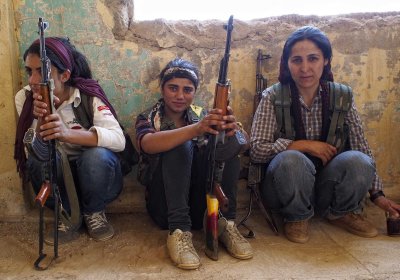“The only cost-effective way to stop illegal immigrants trying to storm through the Channel Tunnel is to set up a machine gun and take out a few people,” Steve Uncles, the extreme right-wing English Democrats' candidate for the post Kent Police and Crime Commissioner, wrote in an August 4 Facebook rant.
“[T]hat would stop it very quickly and immediately cut dead this tactic … who has got the guts to do this in our politically correct society?”
Tony Iltis
The July 23 deal between the US and Turkey — which gives the US access to Turkey's Incirlik airbase and officially brings Turkey into the US-led “war on ISIS” — makes one thing clear.
For Turkish President Recep Tayyip Erdogan and his ruling Justice and Development Party (AKP), the real enemy is not the terrorist group calling itself the Islamic State — more commonly known as the Islamic State of Iraq and Syria (ISIS). It is the Kurdish freedom movement and the Turkish left.
 Turkey has “joined the war against ISIS”, according to US politicians and the corporate media after a July 23 deal between the US and the Turkish government. The deal gives US war planes and drones access to Turkey's Incirlik airbase from which to conduct air strikes in Syria and Iraq.
Turkey has “joined the war against ISIS”, according to US politicians and the corporate media after a July 23 deal between the US and the Turkish government. The deal gives US war planes and drones access to Turkey's Incirlik airbase from which to conduct air strikes in Syria and Iraq.
On the weekend of July 18 and 19 there was another round of right-wing Reclaim Australia (RA) protests.
The stated aim of RA and its offshoot, the United Patriots Front (UPF), was to defend what they call “Australian values” from the threat of “Islamicisation”.
On July 20, 32 people were killed in a suicide bombing attack on a cultural centre in Suruç, a town in Turkish Kurdistan. More than 100 were injured.
Suruç is located across the border from the Syrian Kurdish town of Kobanê, which was besieged by forces of the self-styled Islamic State terrorist group, also known as the Islamic State of Iraq and Syria (ISIS), between September and January.
The Bulgarian Prisoners Rights Association (BPRA) has made progress in its attempts to bring due process into Bulgaria's parole laws.
Founded in 2012, the BPRA has been represented on a Ministry of Justice working group on prison reform since May. Their representative is Valio Ivanov, who was released from Sofia Central Prison in February after serving 22 years — 20 in solitary confinement.
Ivanov succeeded in getting the working group to recommend changes in parole laws, BPRA chairperson Jock Palfreeman told Green Left Weekly.
 YPJ fighters defending Kobanê, June 26. Photo: ypgrojava.com.
The “Islamic State” (IS) terror group attacks in Tunisia, Kuwait and France have grabbed global attention and condemnation. But the group's attack on Kobane in Rojava (Syrian Kurdistan) — and the fierce resistance — has been largely ignored.
YPJ fighters defending Kobanê, June 26. Photo: ypgrojava.com.
The “Islamic State” (IS) terror group attacks in Tunisia, Kuwait and France have grabbed global attention and condemnation. But the group's attack on Kobane in Rojava (Syrian Kurdistan) — and the fierce resistance — has been largely ignored.
 Turkish-backed terrorists have massacred civilians in Kobanê. Photo: Kurdish Resistance & Liberation/Facebook.
Turkish-backed terrorists have massacred civilians in Kobanê. Photo: Kurdish Resistance & Liberation/Facebook.
The Kurdish town of Kobane in northern Syria was attacked on June 25 by forces from the self-styled Islamic State (IS) terrorist group, which crossed from Turkey. This was the first significant IS attack on the town since a five-month siege was repulsed in January.
The attack appears to be a Turkish-backed response to recent military gains made by the Kurdish-led forces of the Women's Defence Units (YPJ) and People's Defence Units (YPG).
 It has become a disturbing hallmark of the current government that the degree to which Prime Minister Tony Abbott adopts the style of a Nazi leader addressing the Nuremburg Rally is a reflection of the policies being foreshadowed. At Abbott's June 23 press conference, the flag count was up to 10. The parliamentary sitting week that followed was an assault on democratic rights.
It has become a disturbing hallmark of the current government that the degree to which Prime Minister Tony Abbott adopts the style of a Nazi leader addressing the Nuremburg Rally is a reflection of the policies being foreshadowed. At Abbott's June 23 press conference, the flag count was up to 10. The parliamentary sitting week that followed was an assault on democratic rights.
Reports of physical and sexual violence, including against children, continue to emerge from Australian refugee detention centres in Papua New Guinea and Nauru. Allegations have also emerged that Australian authorities had paid people smugglers to take a boat of asylum seekers away from Australian waters.
But the government has continued to respond with secrecy, vilification of critics and increasingly draconian government measures to prevent information coming out.
The Bulgarian Prisoners' Rehabilitation Association (BPRA) won a victory on May 22 when it was invited to send a representative to a Ministry of Justice working group on prison reform.
The BPRA was founded in 2012 by Jock Palfreeman, an Australian anti-racist activist serving a 20-year sentence in Sofia central prison after he was framed for murdering a neo-Nazi. It is the first inmate-run prisoners' rights group in Bulgaria's history.
- Previous page
- Page 8
- Next page







